Because I hit the "back" arrow button at the wrong time while editing my first draft of this, I'm having to type it over again (in abbreviated form out of necessity). My apologies for it getting out so late, but since I don't eat lunch, or have time to, I can only do these when I get home from work.
First off, I just want to thank all of those who replied to my post and answered my questions yesterday. I wasn't just asking them to fill my quota for my topic per the Lunch Report. This information is both essential and fascinating to me.
Today's post-work "lunch" will be Christmas dinner leftovers: injected pork roast, stuffed turkey roll and smoked brisket and all the usual holiday meal sides (including green bean casserole:|). After last night's excellent, perfect-for-the-frigid-weather chicken and sausage gumbo and a hard-fought, much-needed victory for the Saints, leftovers and TV reruns are looking pretty poor in comparison.
This post is all about the neck and what the differences are as pertains to the tone of the guitar. There are other threads that deal very well with differences in radius, neck length and fret distance ratios as they impact playing the guitar. I'm focusing on sound quality here.
On to the question (or part of it anyway), which in this case spreads out to a much broader area: rosewood vs maple fretboards - is there a difference in tone when it comes to an amplified guitar? This question as is might have more than a few people drawing a line in the sand. However, what I'm hoping for is some experience/observations from those of you with more than one (preferably G&L) guitar of similar style and setup while with different fretboards.
My other (first) guitar is a Fender "vintage" partscaster with a well-worn rosewood fretboard that I've played for over two decades. It was so worn, in fact, that though it desperately needed a fret job, and I had not yet met anyone I could trust to do that to such an old guitar (the neck is much older than the body), I ended up with a 2009 USA Fender Strat that was nearly a modern copy of the classic one - with a newly polished, smooth rosewood fretboard while the original went into semi-retirement. All of those years playing guitar went by with the assumption based on opinions I wanted to agree with, that rosewood made for a deeper and richer sound quality and those "metal heads" and "shredders" could keep their maple fretboards - which brings up another possible myth and question:
Are maple fretboards actually faster than rosewood for running up and down the neck or is it more about the player and the style? But, since this question isn't directly related to the overall tone of the guitar, feel free to skip it.
While thinking about guitars as I write this it occurred to me that, with a very few exceptions, all of the acoustic guitars I've seen/owned have had rosewood fretboards. There must be a reason for that.
At the same time, once that cable is plugged in and the tubes in the amp get good and warm, is there really a noticeable difference in tone? I mean when you've got those tubes overdriven and/or the distortion or other effects cranked into the mix of wood, strings and electricity, can you honestly tell the difference if you were blindfolded?
My S-500 has a solid, one-piece bird's eye maple neck and fretboard with stainless jumbo frets and an additional half-inch overall length and wider fret distance than my Fender. In other words, as far from my comfort zone of my other guitar as possible while still being a strat-style six-string. At first, I was hesitant about playing a maple fretboard, but just like everything else about my G&L, I can't do without it for long. Logically, I think it might just come down to personal preference or taste.
I'm sure most of us have seen and heard the video clip which directly compares the S-500 and the Legacy for tone difference based solely on the pickups, but has anyone ever thought about doing the same with guitars where the only difference is the fretboards? Or the real question: would that sort of comparison just be a waste of time?
Phillip
Tuesday's Gone...
-
sirmyghin
- Posts: 1516
- Joined: Wed Apr 28, 2010 4:30 pm
- Location: Ontario,Canada
Re: Tuesday's Gone...
If the wood makes a difference in the sound of an electric guitar it is too miniscule to make a difference behind pickups, amps, and whatever other gear you have out front. Not to mention you picking style. So I pick instruments that have colour schemes I want. I think anyone claiming such a tiny piece of wood as the fretboard, which is laminated to the neck and cannot act on its own dynamically will make a difference, they are right off their rocker.
I can see the benefit of the feel of the woods, if you play on low frets and touch em a lot. But I play on jumbo frets, 6100 is another reason I like G&L using it standard. I never touch the fretboard, so it is all part of the colour scheme.
I can see the benefit of the feel of the woods, if you play on low frets and touch em a lot. But I play on jumbo frets, 6100 is another reason I like G&L using it standard. I never touch the fretboard, so it is all part of the colour scheme.
-
blargfromouterspace
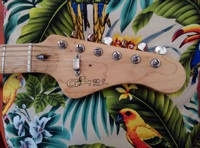
- Posts: 2390
- Joined: Sat Apr 03, 2010 5:45 am
- Location: Central Highlands, Australia
Re: Tuesday's Gone...
I'm with sirmy here, I don't think the fretboard wood makes any difference to the tone of an electric guitar. I have a preference for maple boards but its purely because I like the way they look. I can understand that some people might hear a difference, but my ears aren't that good.
As to speed, I think fret size makes a difference - on vintage frets I find my fingers come into contact with the fretboard which slows me down. I find it particularly annoying when bending. I don't believe a rosewood board would be slower. One thing I've noticed is that rosewood fretboards feel coarser than maple.
The amp and effects color the tone much more than the wood of the solid electric guitar, IMO. There was a clip posted recently of a guy playing a guitar made from a shovel - he demo's it with a LOT of gain and it sounds like any other guitar. I didn't bother much with different amps until relatively recently, and they have become a bit of an obsession of late - having two amps basically doubles the amount of sounds available to you.
As to speed, I think fret size makes a difference - on vintage frets I find my fingers come into contact with the fretboard which slows me down. I find it particularly annoying when bending. I don't believe a rosewood board would be slower. One thing I've noticed is that rosewood fretboards feel coarser than maple.
The amp and effects color the tone much more than the wood of the solid electric guitar, IMO. There was a clip posted recently of a guy playing a guitar made from a shovel - he demo's it with a LOT of gain and it sounds like any other guitar. I didn't bother much with different amps until relatively recently, and they have become a bit of an obsession of late - having two amps basically doubles the amount of sounds available to you.
-Jamie
-
standards guy
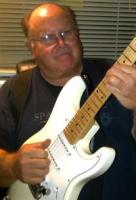
- Posts: 68
- Joined: Wed Dec 01, 2010 4:58 pm
- Location: California Coast
Re: Tuesday's Gone...
I'll play the devil's advocate here and side with the fanatics who say there is a difference in sound discernable between one-piece maple necks, and necks with separate fretboards.
I have always felt that maple necks were lively and bright on tele's and strats, and that rosewood boards were a little duller. I always thought ebony fretboards sounded like one piece maple necks.
Certainly we are talking nuance here, and a particular guitar of one kind or another may be the exception that proves the rule. Yes, pickups and bridge saddle material can possibly trump the effect of a particular fretboard material, but I used to think (before I acquired "old man hearing") that maple necks tended to be brighter sounding guitars.
Of course I originally liked them because the CBS Fender maple necks felt slick and doing faux-steel guitar G bends were easier than on rosewood.
I'm not going to kick the ball back if this thread goes into a game of kickball. I simply wanted to play devil's advocate and voice support for us curmudgeons who insist we can remember things we never really heard, but that's the way our faulty brains remember it: so it's a deep seated opinion.
I have always felt that maple necks were lively and bright on tele's and strats, and that rosewood boards were a little duller. I always thought ebony fretboards sounded like one piece maple necks.
Certainly we are talking nuance here, and a particular guitar of one kind or another may be the exception that proves the rule. Yes, pickups and bridge saddle material can possibly trump the effect of a particular fretboard material, but I used to think (before I acquired "old man hearing") that maple necks tended to be brighter sounding guitars.
Of course I originally liked them because the CBS Fender maple necks felt slick and doing faux-steel guitar G bends were easier than on rosewood.
I'm not going to kick the ball back if this thread goes into a game of kickball. I simply wanted to play devil's advocate and voice support for us curmudgeons who insist we can remember things we never really heard, but that's the way our faulty brains remember it: so it's a deep seated opinion.
-
george4th
- Posts: 4
- Joined: Sun Nov 21, 2010 12:49 am
Re: Tuesday's Gone...
As far as I can tell there is no tone difference between the varieties of fretboard material. Playability, maybe. I prefer maple over rosewood and ebony over rosewood...although all my PRSi are rosewood except a Mira, SAS ans a Starla. Aestetically, I like the look of whatever fits the body. Sometimes a rosewood neck looks goofy on a specific flame or quilted body, but I own a few. So, to recap...IMHO it makes little if any difference so buy whatever looks best to you  On another note I jammed the Commanche tonight...maybe it needs to be setup or the strings may be dead, I did not change them, but I was not overly impressed. Especially after all the hype. It could have just been a bad night for me, so I won't bash it yet
On another note I jammed the Commanche tonight...maybe it needs to be setup or the strings may be dead, I did not change them, but I was not overly impressed. Especially after all the hype. It could have just been a bad night for me, so I won't bash it yet 
-
Philby
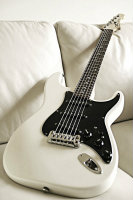
- Posts: 743
- Joined: Mon Sep 27, 2010 3:30 pm
- Location: Melbourne, Australia
Re: Tuesday's Gone...
I'm with Sirmy and Blarg too. There may be a difference between a maple and rosewood neck soundwise, but it is almost negligible behind body wood, pickups, amp type, playing style etc. etc.
There's an interesting comparison here.
To my ears the maple sounds rounder and fuller bodied, which is the opposite to what we're repeatedly told.
From a comfort point of view I have a slight preference for a maple neck but most of the time I don't even think about it. Like Sirmy, I'm more likely to pick a maple or rosewood neck depending on how it matches the colour and finish of the body.
There's an interesting comparison here.
To my ears the maple sounds rounder and fuller bodied, which is the opposite to what we're repeatedly told.
From a comfort point of view I have a slight preference for a maple neck but most of the time I don't even think about it. Like Sirmy, I'm more likely to pick a maple or rosewood neck depending on how it matches the colour and finish of the body.
-
yowhatsshakin
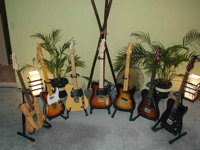
- Posts: 3340
- Joined: Tue Feb 09, 2010 8:00 am
- Location: Seattle
Re: Tuesday's Gone...
I'm with the majority of the earlier posters. My collection is about half rosewoods, half maple with a couple of ebonies sprinkled in. I would be hard pressed to distinguish what board is on a given guitar in a blind test. And IMHO, with all other conditions being equal, tone is for the most part in the 'feel' of a guitar player: phrasing, intonation, vibrato, etc. If it comes down to materials, I think body wood is the largest differentiator; both on electrics as well as acoustics.de Valcourt wrote:On to the question (or part of it anyway), which in this case spreads out to a much broader area: rosewood vs maple fretboards - is there a difference in tone when it comes to an amplified guitar?
All my necks are as fast as my fingers ... which unfortunately is not very fast. But as long as it has 'soul' right?de Valcourt wrote:Are maple fretboards actually faster than rosewood for running up and down the neck or is it more about the player and the style?
There are plenty of acoustics out there with an ebony board. I think it is more due to most necks of acoustics being mahogany (or cedar in case of nylon strings) and a darker kind of board is just esthetically more pleasing in that setting.de Valcourt wrote:While thinking about guitars as I write this it occurred to me that, with a very few exceptions, all of the acoustic guitars I've seen/owned have had rosewood fretboards. There must be a reason for that.
Interesting side note: Except for the early models with a skunk stripe and a maple board, which I presume to be a one-piece maple neck, G&L has always had necks consisting of at least 2 pieces; both the Bi-Cut neck as well as the modern neck where the fretboard is cut off before reassembly.standards guy wrote:I'll play the devil's advocate here and side with the fanatics who say there is a difference in sound discernable between one-piece maple necks, and necks with separate fretboards.
- Jos
-
Dave_P
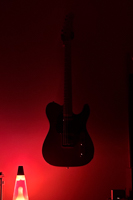
- Posts: 373
- Joined: Fri Oct 15, 2010 9:11 am
- Location: Rhode Island, United States
Re: Tuesday's Gone...
If there is a difference I can't tell, I have two asats one maple one rosewood. They do sound different but I attribute it more to body wood (one is ash the other alder) and pickups (both large MFD, one leo era-less windings, the other BBE).
I do prefer an all maple neck though, as Jamie said the rosewood feels more coarse, I just prefer the way maple feels/looks. There are exceptions though, but if I were to order a guitar it would have birdseye maple.
-Dave
I do prefer an all maple neck though, as Jamie said the rosewood feels more coarse, I just prefer the way maple feels/looks. There are exceptions though, but if I were to order a guitar it would have birdseye maple.
-Dave